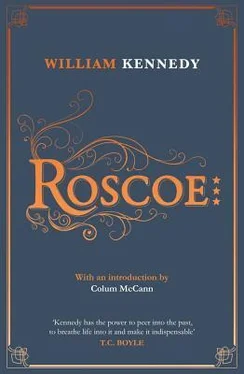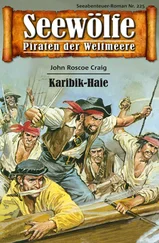“Tell him I went up on the roof for a suntan.”
“I’ll talk to him,” Roscoe said. And he did. When he came back to the table he told Mac, “I said I’d try to persuade you to come in.”
“Not going.”
“He said he’s only kidding about turning in your badge.”
“Always a joker.”
“I think I calmed him down,” Roscoe said. “And I’ll fix it with Patsy. When O.B. sees he can’t win, he won’t fight it. I’ve seen this in him all his life.”
“I don’t turn in the badge, I don’t turn in the gun.”
“He wants to talk. I’ll go in with you.”
Roscoe called Patsy from Herman’s phone booth, and Patsy said O.B. was making too much of it and he’d cool him down. Roscoe told this to Mac. Joey Manucci drove Roscoe and Mac to police headquarters at Eagle and Beaver Streets, and Roscoe led the way into the chief’s inner office, where, Roscoe decided, O.B. had truly arrived. This was the place O.B. had moved toward as soon as he knew it existed, a true believer in authority. Half their lives the Conway brothers worked the same territory, O.B. after the dominance, Roscoe not interested. O.B. called himself the Doctor: “You had a problem? Why didn’t you call the Doctor?” On his desk he kept a small sign: “The Doctor is in.” The Doctor possesses the arcane knowledge that eludes you. The Doctor sees what ails you and can prescribe a cure. And Mac, walking beside Roscoe, is another of the arrived: quirky Mac, maker of dead meat. He had a calling, knew how it was done. O.B. didn’t have that assassin’s ease, but he and Mac both knew how to become, and they became; both knew how to be, and they are: final versions of themselves. It was a lesson to Roscoe.
O.B. was at his desk, sleeves rolled, red-and-ocher tie on a white shirt open at the collar, wearing his bifocals to read a complaint sheet. Roscoe and Mac stood in front of the desk. O.B. took off his glasses.
“So we’re here,” Roscoe said.
“You goddamn ingrate,” O.B. said to Mac, “after all I did for you.”
“Ingrate? You broke my jaw,” Mac said.
“Put your pistol on the desk,” O.B. said, his middle right knuckle a scab.
“Wait a minute,” Roscoe said.
But Mac took his pearl-handled pistol out of his back-pocket holster and, standing to the right of the desk as he had at Jack’s bed, told O.B., “I’m gonna break your jaw.”
When O.B. saw the way the pistol was rising in Mac’s hand, he moved his head away from it, and so Mac’s bullet did not enter the front of his jaw as Mac had intended, but his left temple, which sent O.B. to a new place. Mac then handed his pistol to Roscoe.
“Lunatic. You goddamn lunatic,” Roscoe said. “You’re as dead as he is.” He stared at O.B.’s head on the desk. “He’s my brother.”
“He was the best friend I ever had,” Mac said.
The walls of O.B.’s office were the same pale blue as Elisha’s final face.
When Elisha stepped off the train and stood alone on the platform, Roscoe called to him through the train window. But Elisha only tapped his right foot as the train pulled away. Now Roscoe entered the barn where the Communion of Saints was sponsoring its perennial flea market. Crowds moved from stall to stall, buying St. Teresa’s eyelashes, chips off St. Peter’s shinbone, St. Sebastian’s arrowheads, and, new this year, the curly toenails of St. Anthony’s demon temptress. Roscoe asked to see Elisha.
“We have no one by that name,” the Registrar said.
“He got off the train here.”
“Has he performed any posthumous miracles?”
“He’s working on that.”
“Many are called, sir, but even the holiest of men rarely qualify, because of the severe demands of the moral law.”
“Elisha wasn’t up on the moral law. He wasn’t even a Catholic.”
“Ignorance of the moral law is no excuse.”
“No, but it’s a living.”
Roscoe wanted to tell this fellow that not morality but fraudulence is the necessary modality for human existence. Nothing is, or ever was, what it seems. Thou shalt not commit honesty. Elisha died a martyr to this creed.
“Those thoughts,” the Registrar said, “are unacceptable here.”
“I’m glad we agree on something,” Roscoe said.
There was Roscoe all over page one again: lofty pol, whorehouse lawyer, now intermediary for the killer-cop who killed his brother. What he must be going through. See Roscoe in mourning with his sister Cress, see widow Hattie in her weeds, see the police honor guard standing at the hero’s grave.
“I never thought he’d die in bed,” said Hattie. “But to have my little Mac do him. And I put them together.”
O.B.’s death put her in tears at first, weep, stop, weep again. Then she was over it. O.B. was an erratic, mediocre husband, not such a bad lover, a pal who made her feel like an insider, told her everything that wasn’t an official secret, brought her fresh bread and cake from the Jewish bakeries, roasts and chops from the Armenian butcher, never came by empty-handed before or after they were married. And why did they ever marry? Well, he made her feel safe, and he chased her, as he chased so many, but probably he married her for more reasons than her enduring nubility: one, because it would — oh, sibling treachery — one-up Roscoe, whom, two, Hattie loved in her way-premarital blockade. But Hattie also had her reasons: one, Ros wasn’t available to her, the way Veronica wasn’t available to Ros, who therefore married Pamela, as Hattie therefore married O.B.; and, two, Hattie, invincibly lonely, always has to marry somebody.
Mac immediately pleaded guilty when charged with first-degree murder. I did it, he said, give me the chair. Sorry, Mac, you can’t plead to the capital crime. You need a lawyer, and don’t ask Roscoe for any more favors. Mac stopped eating in jail, wanted to die; so many maniacs in this suicide roundelay: Jack and Elisha, and then O.B. deciding that stealing Mac’s women and ending his career as a cop were mere amusements, and Mac assuming a jaw-shot would be judged as tit-for-tat, all of them lying to themselves as they designed their own finales. From his car on the curving road to O.B.’s new grave in St. Agnes Cemetery, Roscoe saw where Hattie’s fourth husband, Benny (the) Behr, another one, was buried: Benny, who blew a hole in his head with a shotgun when he couldn’t stand the pain in his spine. No hallowed ground for you, Ben, your place is with the suicidal trees. But Hattie wouldn’t hear of that, and confessed to the chancellor of the Albany Catholic Diocese that she was the one who blew that hole in Benny’s pain. Bless me, Father, I did murder. Punish me, not him, such a good man, how could I sit there and watch him suffer and do nothing to help him? The chancellor believed Hattie, and so Benny joined the hallowable dead in the St. Agnes underworld. The chancellor also said Hattie should tell the police what she did, but she told only Roscoe, and nobody prosecuted St. Hat — after all, she didn’t do it. The chancellor kept Hattie’s confession to himself, as did Roscoe, and it remained secret even to Benny.
O.B.’s fresh grave lay alongside Felix’s obelisk, which rested on a pedestal into which the name Conway was engraved; and the pedestal was losing ground to the encroaching sod.
“You see that?” he said to Cress.
“Of course I see it,” she said. “Mama’s and Papa’s graves.”
“I mean the sod. Look at the sod.”
“Yes, the sod. They’re under it.”
“I mean we should come back up and cut away that sod. It’s overgrowing the stone.”
“If you cut away the sod the grass dies, and then it comes back as clover and dandelions.”
Читать дальше












